

Discover more from Real Gaijin
Costco Expands Reach Across Japan with the Support of Mini Resale Shops
Private label Kirkland Signature brand items are both a novelty and a big draw as Japanese consumers flock to Costco resale stores.

Listen to and/or watch the “Read My Lips Podcast Series” version.
What’s new: Independent, small Costco stores are appearing in local supermarkets across Japan. Sometimes they open as stand-alone pop-up retail stores. While prices tend to be a bit higher, these Costco resale stores make it possible to buy in small quantities and avoid the annual membership fee.
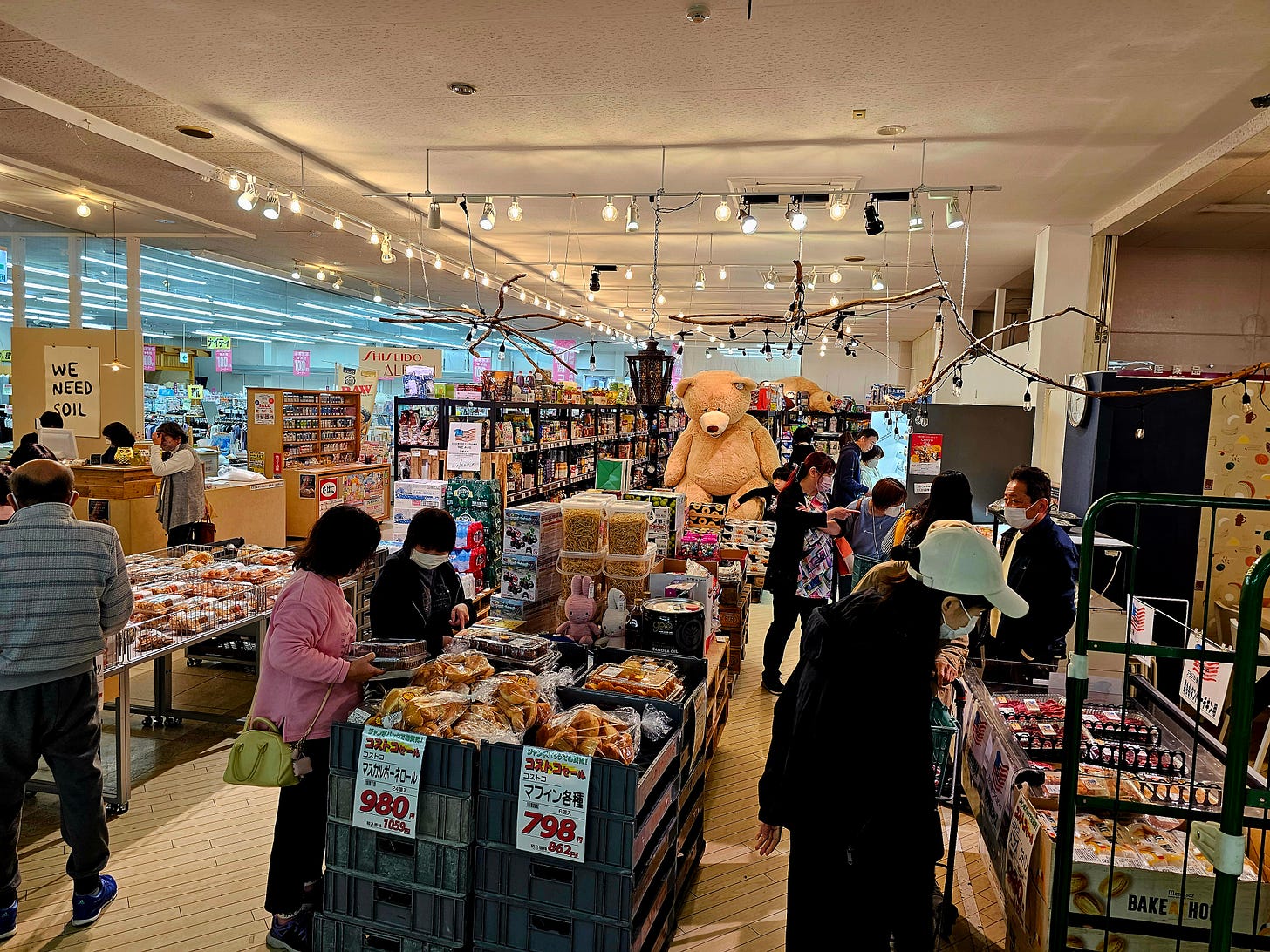
Why it matters: This initiative, apparently sanctioned by Costco Wholesale Japan, is an example of how a flexible approach to meeting customer needs in a local market can lead to increased sales and market penetration by a foreign company trying to operate in Japan.
By partnering with a Costco resale store, local supermarkets have also found a way to compete with the giant supermarket chains.
What’s happening: The reason for this new service, which has captured the hearts of Costco fans who are not members, was in large part due to Covid. Costco enforced a companion limit from April 2020 to October 2022, during which time only a member's relative and one child under the age of 18 could enter the store. Although the member could share items, the appeal of the Costco experience ended up being greatly diminished if a shopper could not visit the store. This policy spawned the cottage industry of Costco resellers, who buy items sold at Costco and resell them.
The phenomenon developed in major metropolitan areas, including central Tokyo, as well as in rural areas far from a Costco warehouse. Stockmart Shimokitazawa became the first resale store to open in Tokyo in May 2022. Their second store, located in the Tokyo suburb of Fuchu, opened in August 2022. The Fuchu store attracted a lot of attention because it was located in a shopping arcade in front of a busy train station, and about 300 people lined up to get in on the first day. The store had to reduce its hours for a while because it could not keep up with the demand.
"Since we started our Costco resale business, sales have quadrupled, and our Instagram followers have grown significantly, from about 4,000 to 35,000." - Emi Kuroda, Public Relations Manager, stockmart
Stockmart buys inventory directly from Costco stores twice a day and transports everything by truck. Depending on traffic, products are sometimes purchased just before the store opens but are further sorted and repackaged into smaller containers before being placed on the shelves. There is almost always a line out the door at the start of business. Store managers are always pressed for time, as backorders are common.
What they're saying: Costco seems to be encouraging the growth of this type of reseller. At least they are not actively discouraging it.
"There is no problem reselling the products in this way because we originally have a history of selling products for businesses such as restaurants." - Official statement from Costco Wholesale Japan
Japanese consumers love it.
"I don't have to go far, and if I can buy it without being a member, it's better." - Shopper at a mini Costco resale store inside a supermarket in Okazaki City, Aichi Prefecture
In addition to convenience, consumers avoid paying the annual membership fee of about 5,000 yen (US$32.95) per year.
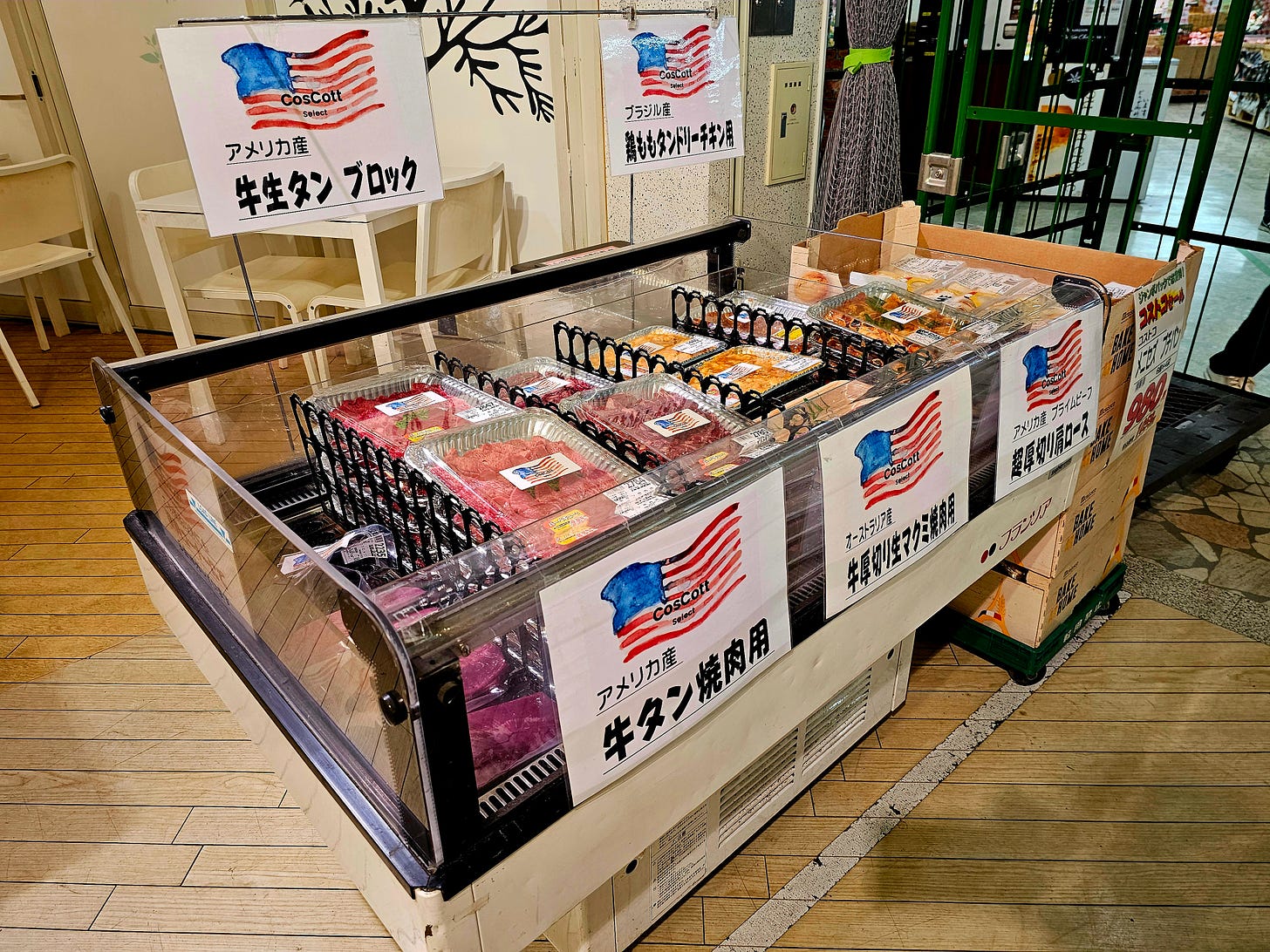
Yes but: There is a price premium to shopping at the mini-Costco resale stores.
"The cost is a little higher, but considering the annual membership fee and transportation costs, it is by far more economical to shop here." - Ryoji Okamura, Store Manager, Cost Walk PIAGO Dou Store, a resale shop in Okazaki City, Aichi Prefecture
Dinner rolls cost 558 yen ($3.68) at Costco, but at the Cost Walk PIAGO Dou Store they sell for 744 yen ($4.90), about 20% more.
The giant tiramisu is 2,786 yen ($18.36) compared to about 2,200 yen ($14.50) at Costco, and the high roller is 2,448 yen ($16.13) compared to about 1,700 yen ($11.20) at Costco.
Costco's resale stores are, however, careful not to price their merchandise beyond what consumers are willing to pay. There is no set formula for setting prices, but stockmart, for example, frequently checks social networking sites of Costco fans and other sources to keep its finger on the pulse of consumers.
And while Costco is known for its low prices by cutting costs through bulk sales, these mini-pop-up shops, which sometimes appear in stand-alone buildings or in a section of a local supermarket, offer point-of-sale packaging that is more likely to fit in a Japanese pantry.
"Costco usually sells products in large quantities, but in our store we sell products in smaller quantities, such as in mini-packets of 3 units, to make them more affordable." - Store Manager Okamura
At the Cost Walk PIAGO Dou store, in addition to regular sizes, rolls are sold in smaller portions, such as 3 for 110 yen ($0.72).
Despite the price premium, the portion packs are very popular. For example, consumers are given the option of purchasing a set of 30 rolls of toilet paper for 77 yen ($0.51) per roll, just like how this product is sold at Costco, or as a smaller size that has been break-packed down to only 6 rolls for 120 yen ($0.79) per roll.
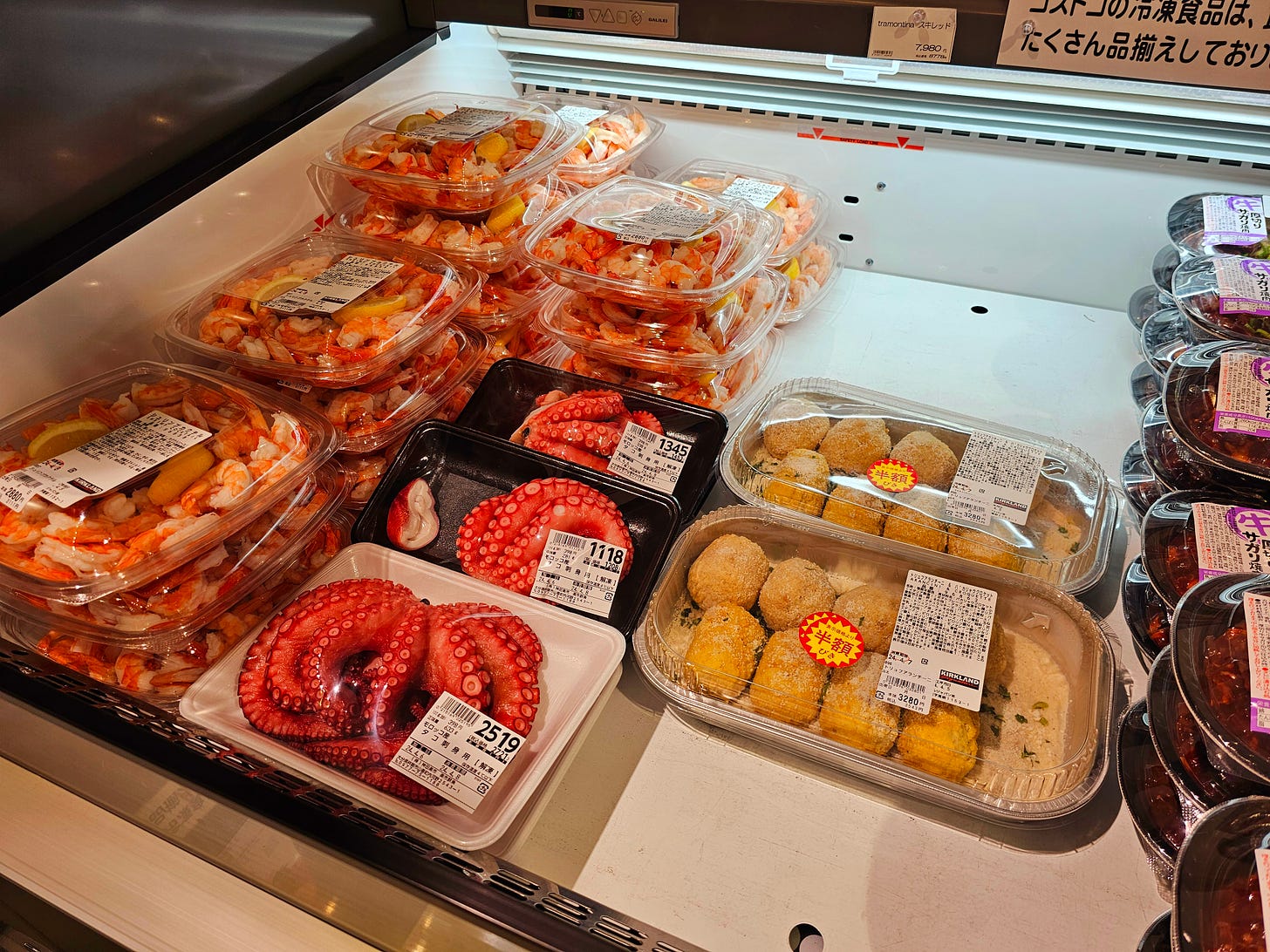
By the numbers: Costco may have realized that it has already achieved maximum market penetration through its traditional warehouse store approach.
Costco opened its first warehouse store in Japan in 1999. The large volume of merchandise and the huge warehouse space, which was a completely original approach to shopping in Japan at that time, gave their customers an extraordinary feeling of shopping in a foreign country. The fact that you had to be a member to enter a Costco also created the feeling of an event. Costco enjoyed almost instant success as friends and neighbors routinely went together on Costco shopping sprees.
The company now has 33 warehouse locations scattered throughout Japan1.
Both business performance and membership have increased each year, although the company does not release figures.
According to the stated requirements listed in the corporate section of the website for Costco Wholesale Japan, the company seeks to establish new locations for its warehouse model, but conditions apply.
"We plan to add more warehouse stores in the future so that everyone in Japan can enjoy shopping at Costco close to home." - Official announcement on Costco's Japanese-language website
The requirements for a suitable location are high.
Population generally greater than 500,000 within a 10 km (6.2 mile) radius.
Regions with a large number of businesses
Site Area: 15,000 tsubo2 (approximately 50,000 square meters or 534,000 square feet) or more (including a suitable spot for a gas station)
Building Area: about 4,500 tsubo (about 15,000 square meters or 160,000 square feet)
Zoning: Semi-industrial, Commercial neighborhood
Parking Capacity: Enough space for 800 cars or more
Property with good access to surrounding roads
For purchase or long-term lease (40 years or more)
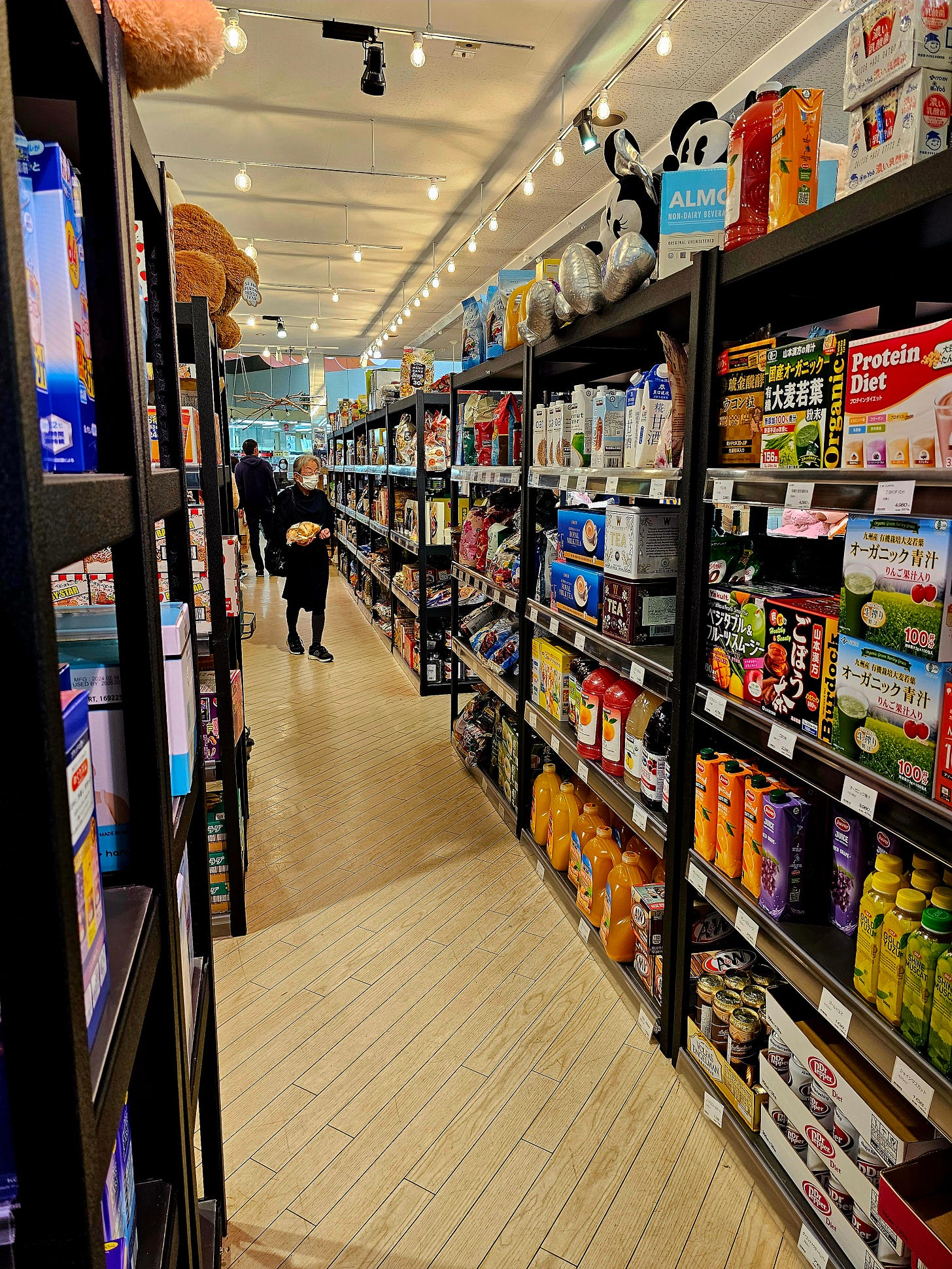
Commentary: This is great news! When we lived in Tokyo, my family made regular trips by car to one of the Costco warehouses in Yokohama to stock up on staples as well as hard-to-find items from the U.S. (Of course, despite the lines and concerns about nutritional value, we always found time for their signature hot dog and soft drink or a slice of pizza!)
Since moving to the countryside, which is at least a two-hour drive from the nearest Costco, we have let our membership lapse and simply decided to do without. When one of these mini-Costco resale stores literally popped up in a nearby local supermarket a few years ago, while we were put off at some of the premium prices, we went all out for certain items not normally available in Japan. Recently, this store has expanded considerably. Their frequent sales routinely draw customers away from other supermarkets.
While I miss the free samples and sheer selection at a regular Costco, the mini-Costco resale store is the next best thing.
Although the requirements for a full-size Costco warehouse are probably too demanding for our neighborhood, having a regular Costco nearby would, of course, be ideal. Until then, however, we will be content (and thankful) for the mini Costco pop-up store in a nearby local supermarket. Where else are we going to find microwave popcorn?
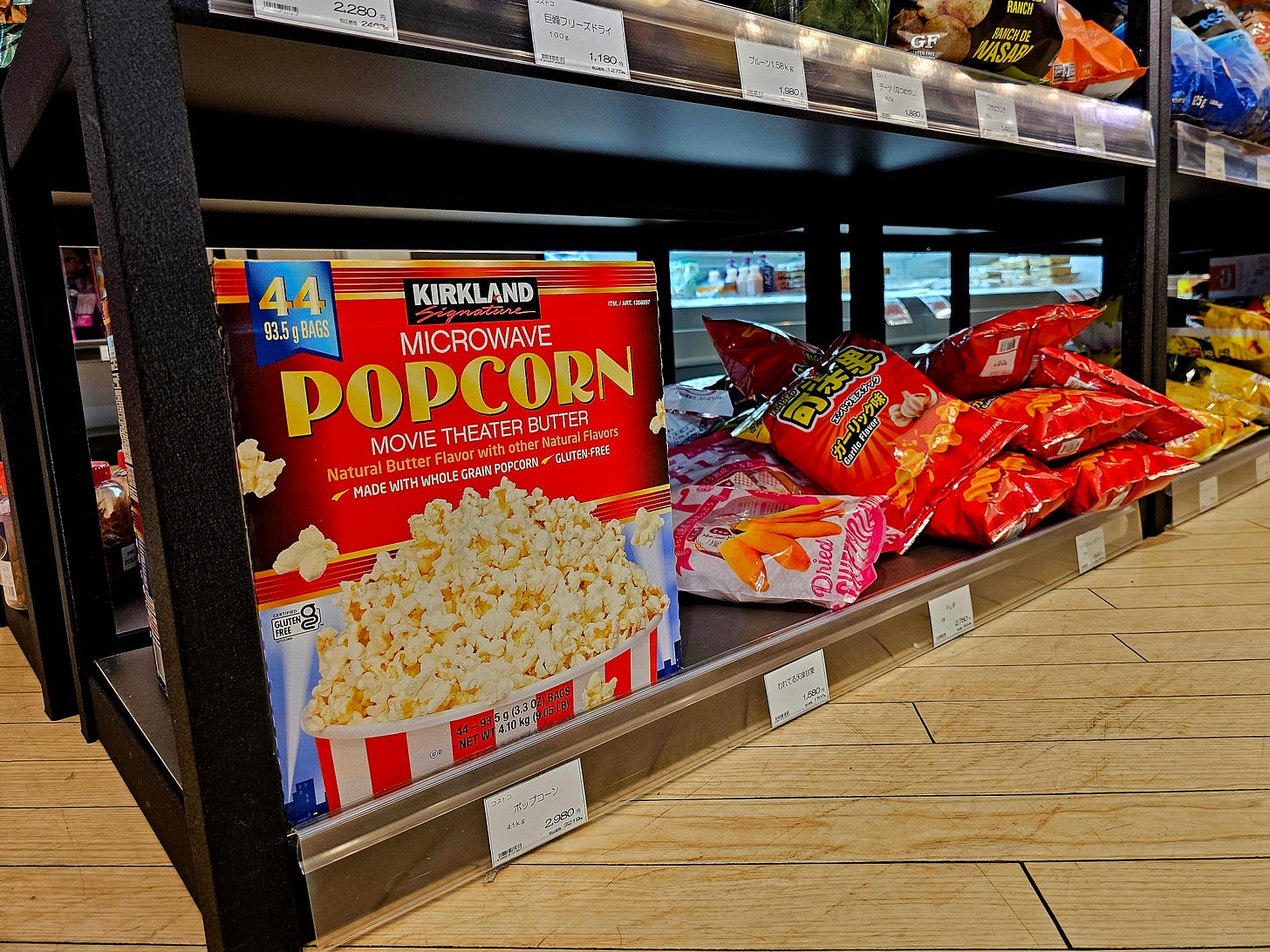
What’s next: By guaranteeing the growth of mini-Costco resale stores across the country, Costco is helping to expand its reach and further penetrate the market. They are also paving the way for the possible introduction of a smaller warehouse model.
I suspect that Costco executives are already scouting locations for future warehouse stores. By encouraging this type of "antenna store," they are laying the groundwork for further market penetration. As a result, rural consumers are likely to see more of these resellers popping up across the country.
Now that Costco's own prices are likely to increase against the backdrop of a weak yen, the key for resellers will be how much they can appeal to consumers with a value beyond price strategy.
What do you think? Despite the cost premium, is shopping at a mini-Costco resale store worth it? All answers are completely anonymous, even to the author.
Links to Japanese Sources: https://news.yahoo.co.jp/articles/0ffbbffedadbd27065fa708c8d3e3dab8feb8d79 and https://toyokeizai.net/articles/-/629904.
#Costco #Kirkland #KirklandSignature #PrivateLabel #NoAnnualFee #WarehouseStore #Reseller #Resale #BreakPack #Retail #Retailing #Wholesale #コストコ #プライベートブランド #年会費不要 #倉庫型店舗 #再販店 #転売 #小分け #小売り #卸売り #小売店 #販売 #コストコ再販店
Please note that you can subscribe to Real Gaijin for free. If you are so inclined, you can also purchase an annual subscription for a relatively small fee.
However, I understand that even the lowest level of annual subscription allowed by Substack may seem too high for many. If you just want to buy a coffee for Real Gaijin (or maybe a green tea), you can also make a small donation here:
https://buymeacoffee.com/realgaijin
All levels of support - including just liking a particular article and/or leaving a comment - are very welcome. Thanks again for reading.
While Real Gaijin lives in Substack, you can also find Real Gaijin on a few other platforms (listed in alphabetical order).
https://www.instagram.com/real_gaijin_on_substack/
https://www.threads.net/@real_gaijin_on_substack
https://www.tiktok.com/@real.gaijin
https://www.youtube.com/@RealGaijin
https://www.linkedin.com/in/mark-kennedy-5b50b71/
Current as of August 24, 2023 (www.costco.co.jp/AboutCostco)
One tsubo is a unit area, roughly 3.3 m2 or 35.5 ft2, equivalent to the area of two rectangular tatami mats placed side-by-side to form a square.
Subscribe to Real Gaijin
Unveiling the Real Japan: An American Expat's Inside Look | Hot takes, commentary, and unfiltered insights on life as a foreigner in Japan.













Costco is an American bulk/wholesale grocery chain? What's the attraction? American goods that can't be purchased elsewhere in Japan? Low prices? Quality? All three?!
I just discovered I can order from Costco online and there is no delivery fee for orders over $75 which is far less then I spend in the store. Ordering online benefits me in several ways. I save gas from driving 60 miles round trip to the nearest Costco. I save time from driving and spending time shopping. I save money because I purchase only what I need. There are are too many temptations screaming at my wallet when I shop in the store. So I love the service and I shop at Costco more often!